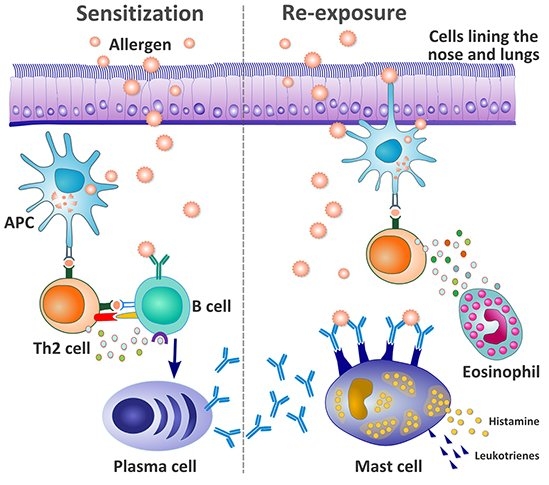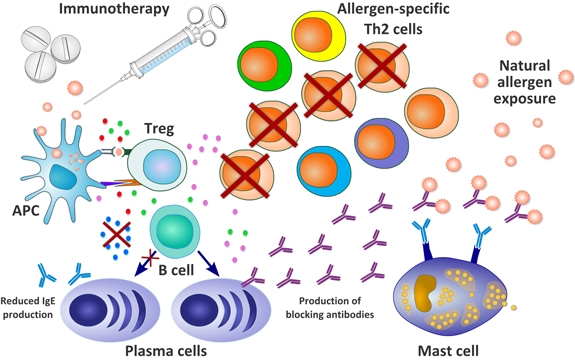Whether it’s nuts, shellfish, pollen or pet hair, many people have allergies. 2.5 million Canadians have some kind of allergy - including
asthma,
eczema and
hives [1] - which is the most common reason for trips to the emergency department. The rate of food allergies is increasing as well
[2]. Allergies can get annoying at times - preventing you from working or spending time with loved ones - but you can blame your body!
An allergy is the immune system’s exaggerated response to common substances. The immune system is a vital system in the human body that produces antibodies - proteins that protect the body from and attack foreign substances. When a person has an allergy, the immune system makes
antibodies that target allergens that aren’t harmful to the body at all, like peanuts or milk. Allergic reactions differ from person to person, and can range from skin irritations to swollen body parts to anaphylaxis - closing of the airways
[3]. Allergies can develop at any age, and there’s a great risk for developing them if a person has a family history of allergies
[4].

There are many kinds of allergies, including: food, skin, insect sting, eye, drug, latex, and respiratory allergies. If you have a respiratory allergy such as asthma or hay fever, treatment and prevention can simply consist in avoiding the allergens that trigger your condition. If that’s not enough, you can try medications such as: antihistamines, decongestants or nasal sprays. If those don’t work,
immunotherapy - injecting the body with allergens in increasing doses in an attempt to desensitize the immune system - may be needed. Immunotherapy is also effective for insect allergies, but do not work for food allergies - the latter requires avoidance only.
How do you know if you have allergy? By knowing yourself! Diagnosis depends on a patient history, which includes the types of reaction that occurred following exposure/consumption of the allergen. In addition, a
skin test will be performed and monitored. There are two kinds of skin tests. In the first one, the allergen is pricked/scratched on the surface of the skin, usually on the back or forearm. If you’re allergic, the test spot will have redness or swelling. In the second kind of skin test, the allergen will be injected directly into the skin. For both types of skin tests, many allergens are tested simultaneously
[5].

While skin tests are extremely sensitive, they are not 100% accurate. Blood tests to detect antibodies to the allergen - allergens like food, pollen, dander and insect stings - may be needed, and this isn’t covered under Ontario’s Health Insurance Plan (OHIP)
[6].
Being diagnosed with an allergy isn’t the end of the world. Millions of people with allergies live long and comfortable lives, but if you have an allergy, it’s important to understand your condition: know what your triggers are, how to treat the symptoms and know when to seek medical attention. If you think you have an allergy, contact your physician, who will refer you to an allergist. You can visit the Allergy, Asthma and Immunology Society of Ontario’s website
to learn more.

 There are many kinds of allergies, including: food, skin, insect sting, eye, drug, latex, and respiratory allergies. If you have a respiratory allergy such as asthma or hay fever, treatment and prevention can simply consist in avoiding the allergens that trigger your condition. If that’s not enough, you can try medications such as: antihistamines, decongestants or nasal sprays. If those don’t work, immunotherapy - injecting the body with allergens in increasing doses in an attempt to desensitize the immune system - may be needed. Immunotherapy is also effective for insect allergies, but do not work for food allergies - the latter requires avoidance only.
There are many kinds of allergies, including: food, skin, insect sting, eye, drug, latex, and respiratory allergies. If you have a respiratory allergy such as asthma or hay fever, treatment and prevention can simply consist in avoiding the allergens that trigger your condition. If that’s not enough, you can try medications such as: antihistamines, decongestants or nasal sprays. If those don’t work, immunotherapy - injecting the body with allergens in increasing doses in an attempt to desensitize the immune system - may be needed. Immunotherapy is also effective for insect allergies, but do not work for food allergies - the latter requires avoidance only.
 While skin tests are extremely sensitive, they are not 100% accurate. Blood tests to detect antibodies to the allergen - allergens like food, pollen, dander and insect stings - may be needed, and this isn’t covered under Ontario’s Health Insurance Plan (OHIP) [6].
While skin tests are extremely sensitive, they are not 100% accurate. Blood tests to detect antibodies to the allergen - allergens like food, pollen, dander and insect stings - may be needed, and this isn’t covered under Ontario’s Health Insurance Plan (OHIP) [6].